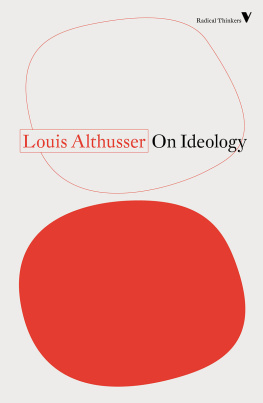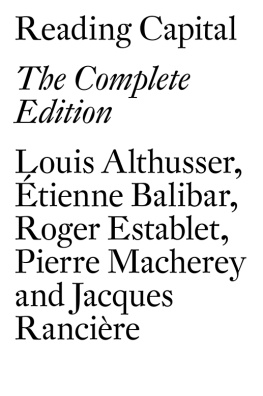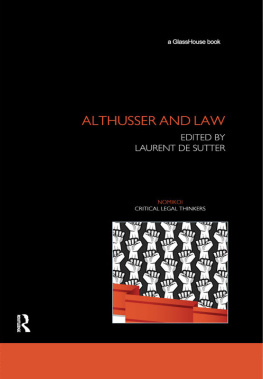Louis Althusser - Philosophy for Non-Philosophers
Here you can read online Louis Althusser - Philosophy for Non-Philosophers full text of the book (entire story) in english for free. Download pdf and epub, get meaning, cover and reviews about this ebook. year: 2017, publisher: Bloomsbury UK, genre: Religion. Description of the work, (preface) as well as reviews are available. Best literature library LitArk.com created for fans of good reading and offers a wide selection of genres:
Romance novel
Science fiction
Adventure
Detective
Science
History
Home and family
Prose
Art
Politics
Computer
Non-fiction
Religion
Business
Children
Humor
Choose a favorite category and find really read worthwhile books. Enjoy immersion in the world of imagination, feel the emotions of the characters or learn something new for yourself, make an fascinating discovery.
- Book:Philosophy for Non-Philosophers
- Author:
- Publisher:Bloomsbury UK
- Genre:
- Year:2017
- Rating:3 / 5
- Favourites:Add to favourites
- Your mark:
- 60
- 1
- 2
- 3
- 4
- 5
Philosophy for Non-Philosophers: summary, description and annotation
We offer to read an annotation, description, summary or preface (depends on what the author of the book "Philosophy for Non-Philosophers" wrote himself). If you haven't found the necessary information about the book — write in the comments, we will try to find it.
Philosophy for Non-Philosophers — read online for free the complete book (whole text) full work
Below is the text of the book, divided by pages. System saving the place of the last page read, allows you to conveniently read the book "Philosophy for Non-Philosophers" online for free, without having to search again every time where you left off. Put a bookmark, and you can go to the page where you finished reading at any time.
Font size:
Interval:
Bookmark:
ALSO AVAILABLE FROM BLOOMSBURY
How to Be a Marxist in Philosophy, Louis Althusser
Being and Event, Alain Badiou
Conditions, Alain Badiou
Infinite Thought, Alain Badiou
Logics of Worlds, Alain Badiou
Theoretical Writings, Alain Badiou
Theory of the Subject, Alain Badiou
Key Writings, Henri Bergson
Lines of Flight, Flix Guattari
Principles of Non-Philosophy, Franois Laruelle
From Communism to Capitalism, Michel Henry
Seeing the Invisible, Michel Henry
After Finitude, Quentin Meillassoux
Time for Revolution, Antonio Negri
The Five Senses, Michel Serres
Statues, Michel Serres
Rome, Michel Serres
Geometry, Michel Serres
Leibniz on God and Religion: A Reader, edited by Lloyd Strickland
Art and Fear, Paul Virilio
Negative Horizon, Paul Virilio
Althussers Lesson, Jacques Rancire
Chronicles of Consensual Times, Jacques Rancire
Dissensus, Jacques Rancire
The Lost Thread, Jacques Rancire
Politics of Aesthetics, Jacques Rancire
Of Habit, Flix Ravaisson

For their help and support, G. M. Goshgarian thanks Jackie pain, Sandrine Ferr, Paul Garapon, Christine Gardon, Franois Matheron, Peter Schttler, Tzuchien Tho, Jean Touzot, Fabienne Trvisan, Laurie Tuller, Maria Vldulescu , Yu Shan, the Editorial Board of Dcalages: An Althusser Studies Journal, and the director, Nathalie Lger, and staff of the Institut Mmoires de ldition contemporaine.
Readers whose knowledge of Althusser derives primarily from the texts published during his lifetime (and perhaps the more well-known posthumous works such as Machiavelli and Us and The Underground Current of the Materialism of the Encounter) will no doubt find Philosophy for Non-Philosophers perplexing. The problem is not its content, that is, the arguments and concepts Althusser advances there: nearly all can be found in previously published work. It is instead the works form, or perhaps genre, that will surprise readers, the fact that Althusser chose to address an audience consisting of non-philosophers, that is, not simply specialists from other academic disciplines, but more importantly a mass audience outside the academic world. The nature (and breadth) of this audience makes it different in kind from a text like Philosophy and the Spontaneous Philosophy of the Scientists (published in 1974 but based on the lectures that Althusser delivered at his seminar in 1967) (Althusser 1974) which was addressed to scientists who were non-philosophers, not in the sense that they did not practice philosophy, but because they did so without knowing that they did so, that is, spontaneously. There Althusser seeks to make visible the tendency among scientists irrespective of their field, to accept as simple and obvious what are in fact complex notions imposed on scientists by a (general, not individual) forgetting of the historical determination of philosophical concepts.
In contrast, the genre represented by Philosophy for Non-Philosophers requires, above all, the simplification of complex arguments, that is, a reduction of the actual written form of these arguments to what is regarded (but by whom and by what means?) as essential, extracting it from the accidental and contingent that envelopes and perhaps conceals it. Because it is essential, it can be explained and communicated through examples drawn from everyday life and in this way understood by everyone. It is this assumption that will allow Althusser, otherwise known as a difficult, even obscure, thinker, to speak (or to think he is speaking) directly to the people in a language that can be understood by those (the vast majority) who have neither the leisure nor the training to read Aristotle or Kant or, for that matter, Althussers own texts.
This last example should give us pause: is the project of Philosophy for Non-Philosophers based on the presupposition, articulated by many of his critics, but never explicitly stated by Althusser himself, that the conceptual density and discursive complexity of his earlier works, even the way Althusser practices philosophy in and through them, is in some sense inessential and unnecessary, constituting a baroque exterior that by calling attention to itself only serves to obscure the otherwise clear and distinct ideas that might be in principle communicated to any rational individual? It is useful to recall at this point that Althusser wrote his Matrise on the notion of content in the works of Hegel, who insisted that to understand form in its determinate existence is to grasp it as the self-understanding of content and not as something applied to it from the exterior (Althusser 1997). The critiques of Althussers mode of exposition and even his style assume that in philosophy and in theory more generally a given form may be applied indifferently and indeterminately (that is, determined in the last instance by authorial choice alone) to any content, which would imply, in turn, that the meaning of a text like From Capital to Marxs Philosophy (Part I of Reading Capital) (Althusser, 1970, 1169) existed outside of and prior to its textual incarnation and could have been be expressed in different, more common, words. To sustain such a notion, however, would be to reject the very arguments of the text itself and to place Althusser in the paradoxical position of restating (in different, simpler, words and phrases) the argument that arguments always appear in a singular, non-repeatable forms from which they cannot be separated. Has Althusser come to occupy this paradoxical space in order to write a work like Philosophy for Non-Philosophers, and, if so, how did he arrive there and what are the consequences of this occupation?
Written (or rather put into final or quasi-final form) in 197880, the time of the crisis of Marxism in general and the crisis of Althussers Marxism in particular, Philosophy for Non-Philosophers embodies the contradictory movements of this precise moment. In part, it is a presentation of Althussers previously stated positions on philosophy (although not all of them, and without any attempt to account for the incompatibilities between the different phases in the development of his thought). But it also exhibits an imitation or mimicry of the affects, and the discourses consubstantial with these affects, of some of Althussers most hostile critics, as if their critiques had been internalized and the collective rejection of Althussers corpus incorporated into the fabric of the text. The result was a kind of theoretical stalemate that prevented Philosophy for Non-Philosophers from advancing beyond its starting point. Althussers decision not to publish the manuscript certainly represented in some way an intuition, however dim, that the work was a kind of unstable compromise formation that accumulated within itself contradictions of both form and content. These contradictions, however, cannot be explained by Althussers worsening psychological state alone; they must also be understood in relation to the conjuncture in which he sought to intervene, as the inescapable effects of an increasingly unfavourable relation of forces. It was this that made the project of speaking directly to the popular masses about philosophy and Marxism appear to Althusser simultaneously urgent and impossible.
Font size:
Interval:
Bookmark:
Similar books «Philosophy for Non-Philosophers»
Look at similar books to Philosophy for Non-Philosophers. We have selected literature similar in name and meaning in the hope of providing readers with more options to find new, interesting, not yet read works.
Discussion, reviews of the book Philosophy for Non-Philosophers and just readers' own opinions. Leave your comments, write what you think about the work, its meaning or the main characters. Specify what exactly you liked and what you didn't like, and why you think so.











